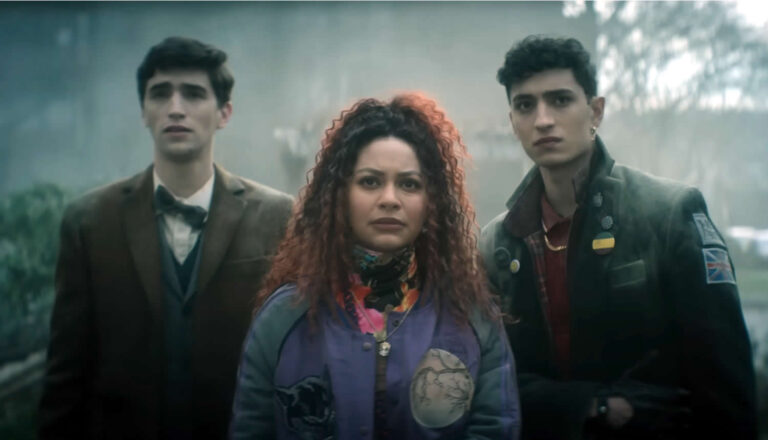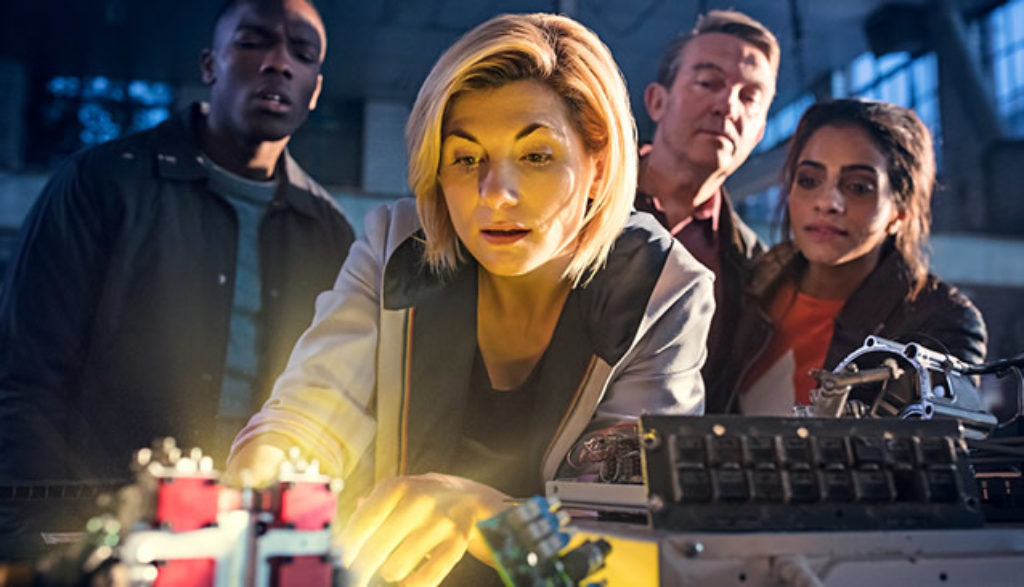
Dead Boy Detectives
Dead Boy Detectives targets teens in style and story. But it comes with very adult, problematic content.

Americans like to think that when it comes to science fiction, we’re the world’s cultural epicenter. We’re home to Area 51, Roswell, N.M., and Comic-Con. We were the culture that created everything from Star Trek and The X-Files to Coneheads and Plan 9 From Outer Space. We surely have more geeks per square mile than anywhere else on earth.
But they’ve never created a franchise to match the once and future king of sci-fi television: the aged yet nearly ageless Doctor Who.
Before Captain Kirk set his first phaser to stun or HAL 9000 sent his first innocent man into the vacuum of space, the good Doctor was cruising through the airwaves of Britain. The show’s mammoth BBC run began in 1963 and continues to this day—though it did take about 16 years off, from 1989 to 2005. This isn’t just a television show. It’s an institution. The only thing that has reigned longer in Britain is the queen herself.
It’s somehow fitting that the centerpiece of Doctor Who is an ever-changing yet nearly ageless character known, simply, as the Doctor.
The Doctor is, ostensibly, a “Time Lord,” a being capable of hopping through space and time with the help of a contraption known as a TARDIS. (It looks suspiciously like a 1950s London police box.) And while he can be killed just like anyone else, he doesn’t “die,” precisely, but undergoes a Phoenix-like transformation and becomes an entirely “new” Doctor—one who looks and often acts much differently than his predecessor, but one who still retains all his memories.
When your show lasts half a century, you’ve got to be able to recast your lead a few times. There have been 13 such incarnations who’ve traveled time and space: The latest, Jodie Whittaker, is the first female to take the mantel. And we’ve not even mentioned the always growing list of companions (most of them human) that join the Doctor in his/her cosmic exploits. The Doctor has saved the galaxy countless times with a curious combination of wit, derring-do and (looking back) laughable special effects.
It’s hard to see the older shows now and imagine anyone getting frightened by, say, the evil Daleks (which look like taller, punked-out versions of R2-D2). But back in the day, Doctor Who was considered by many to be fright-night television.
Though designed as a family show, in the 1970s Doctor Who came under fire for being too scary and gory for children. British activist Mary Whitehouse declared it “teatime brutality for tots,” and she may have had a point. It featured bloodthirsty dolls (Chucky’s forebears?), murderous daffodils and plenty of violent mayhem—including the offing of a Doctor or two. The show supposedly spawned the British phrase “behind the sofa”—as in hiding behind the sofa during its especially scary parts. No less than The Economist suggests that “hiding behind the sofa whenever the Daleks appear” is as quintessentially British as teatime.
Now, with special effects being so much better, Doctor Who may be more frightening than ever. But in an age when televisions are littered with serial killers and worse, the creatures here still have a B-movie quality to them: kinda creepy, kinda campy. Are they a little freaky? Yes. Will they force the average adult into years of counseling? Probably not. The violence they perpetrate shouldn’t be excused or ignored, but it’s only fair to say that their visceral impact is, for the most part, PG.
The show has a few other issues: Sexual allusions and situations (including references to same-sex marriage) are sporadic but still present. The 12th Doctor’s companion, Bill, was openly gay. Mild profanities (including the British curse “bloody”) and misuses of God’s name tag along occasionally. More significantly, the series has been known to dabble in religious themes—not always to the comfort of Christians. Its current worldview is essentially humanist, and it sometimes mocks or dismisses certain religious ideas or ideals. And the mere presence of a Time Lord who, essentially, raises him/herself from the dead every few seasons does in itself provoke a host of theological (and perhaps gender) issues.
Even so, Doctor Who usually feels rooted in a more genteel past. It’s a fun, witty show with geek-friendly charm. And there are certainly far worse ways to spend a Saturday night these days than taking a trip on the TARDIS. But as the Doctor would surely warn anyone who glibly steps through its doors, you ride at your own risk, and there are no guarantees of what you might see.
In the latest season’s premiere, The Doctor is now a woman who has been transported to earth (and she’s still getting used to her new body). She teams up with warehouse worker Ryan Sinclair, his grandma (Nan), her husband (Graham), and a cop named Yasmin to fight off an alien bent on killing humans and collecting them as trophies.
The evil alien kills people by freezing their bodies to near-death (we hear later that he keeps them infinitely suspended between life and death). We hear people scream as part of the freezing process. The alien takes a tooth from each human and implants it into its own face as a trophy. A woman dies by electrocution and another from shock. Buildings and trains explode. Windows are smashed and people are thrown about. A man records a video, predicting his death. A young man talks about his unreliable father and tries to win the favor of others.
A man mentions buying “a pint.” God’s name is misused five times. Someone is called an “idiot” and is told to “shut up.”
The Doctor, slumming as a university professor, agrees to tutor Bill Potts, a young, lesbian cantina worker who goes to the Doctor’s lectures for fun. “Don’t ever be late,” he cautions. “I’m very, very particular about time.” But when a strange, alien entity captures Heather, Bill’s recent crush, the Doctor’s tutoring vaults to a whole new level.
Bill and Heather clearly are attracted to one another, flirting when Heather’s fully human. And Heather literally pursues Bill across time and space after the alien entity inhabits her. That said, the only mutual physical contact we see between the two is a brief clutch of each other’s hands. We also hear a reference to (and a brief glimpse of) another woman to whom Bill was also attracted. When Bill’s foster mother asks her about the Doctor’s special “tutoring,” she suggests that he may have more on his mind than simple education (an insinuation that, of course, is false). Elsewhere, the Doctor’s cyborg assistant, Nardole, references an old, unspecified crush. There’s a reference to “snogging.”
Alien Heather grabs Bill’s face in a threatening manner. In a pretty creepy visual, we see Heather, looking as if she’s dead, stare out from a puddle. When Heather and the alien meld, she looks like a very wet corpse. In a trip to the past, we see Daleks (the Doctor’s mortal enemies) blasting away at humanoid adversaries. Amid that conflict, people fly, things burn, and lasers blast into walls.
Bill’s mother drinks at a bar. (We see wine and other drinks in front of her.) Bill and Heather first meet in a bar-like setting. Characters say “a–” once, “h—” once and misuse God’s name about four times.
“Deep Breath”
Actor Peter Capaldi is introduced as the 12th Doctor, landing in Victorian London with a T. rex. The Doctor is confused and rattled at first (which always happens when he changes personages), but soon he and human helpmate Clara settle in to deal with a bevy of murderous cyborgs looking for the Promised Land.
While the Doctor says that the cyborg’s hope in a Promised Land is just a fairy tale, the spirit of said cyborg eventually finds itself in a flowery garden called “heaven.” Vastra tells Jenny that “people are apes.” It’s suggested that she eats people, and she swears “by the goddess.”
A dinosaur goes up in flames. A man is apparently killed (off camera) for his eyeballs. (We hear the scream.) A vast balloon is said to be made of human skin. The blade-wielding cyborgs are made partly of human parts culled from unfortunate patrons to their restaurant. The cyborg leader has just half a creepy face (the rest is a mass of metal and gears), can take off his hand (revealing a gas torch) and eventually falls a great distance, getting skewered on Big Ben.
Along the way, lizard woman Madame Vastra and her female human “wife” Jenny “kiss.” (Vastra says they’re just sharing air.) And Jenny poses in a cleavage-revealing getup. We hear joking requests for Clara to take off her clothes. The Doctor offers the cyborg a glass of whiskey. We hear “bloody” and “h—” once each. God’s name is misused.
“Cold War”
The Doctor and Clara land on a Soviet sub circa 1983 and find themselves knee-deep in peril (and water). The sub is stuck under 700 feet of frigid ocean, and a monstrous old Martian—revived after 5,000 years in the deep freeze—is stalking the corridors. There’s a worry, of course, that the angry alien may launch a missile, thus sparking a nuclear holocaust. “Hair, shoulder pads, nukes,” quips the Doctor. “It’s the ’80s. Everything’s bigger.”
The alien is mainly encased in armor, but we do see his grotesque claws on occasion—often grasping the heads of human victims. Off-camera screams and a bloody arm sticking up hint at the beastie’s shred-full behavior. We hear about how the Martian’s enemies “respected” him enough to carve his name into their skin before he killed them, and the alien himself threatens to turn the earth into another red planet with the flow of their blood.
Guns are fired. Nuclear buttons are nearly pushed. Bad words are said (“h‑‑‑” twice, “bloody” twice and God’s name flippantly misused thrice).
“Asylum of the Daleks”
In this season premiere, the Daleks turn to their old enemy, The Doctor, to prevent the insane of their kind from escaping a planet-prison made just for them. The Doctor is accompanied by Amy and Rory Pond, a married couple in the midst of a messy divorce. So it’s a bit awkward when Dalek technology threatens to turn the two humans into Daleks themselves, and The Doctor advises them to resist by concentrating on love instead of hate. In so doing, the two reconcile—which was part of The Doctor’s super-secret plan all along.
Naturally, we see Rory and Amy kiss. A woman in a body-hugging dress talks about the fact that the “first boy I ever fancied was named Rory. Actually, she was called Nina. I was going through a phase.” Somebody says “d‑‑n” once. God’s name is misused two or three times.
“The Impossible Astronaut”
The Doctor invites some of his old companions—Britons Amy Pond and Rory Williams, and mysterious time traveler River Song—to America for a new adventure. But before he can tell them about it, he’s killed—and dies in such a way that he can’t regenerate. Luckily, he invited a previous version of himself to help solve his own murder. Unluckily, that Doctor has no idea why he’s there. Or is it here? Neither can his companions tell him, because if they did so the universe would be destroyed.
One of those iconic creepy aliens blasts an innocent woman to smithereens. (The remains look like shreds of a burst balloon.) Amy appears to accidentally shoot a little girl. The Doctor hides underneath the voluminous skirt worn by a 17th-century lady. “This isn’t nearly as bad as it looks,” he says, and he appears to be at least partly undressed. River Song offers a sexual double entendre. Characters say “h‑‑‑,” “bloody” and misuse God’s name. Everyone drinks wine. River mentions that The Doctor was once worshipped on Easter Island and says that a Time Lord’s body is “a miracle.”


Paul Asay has been part of the Plugged In staff since 2007, watching and reviewing roughly 15 quintillion movies and television shows. He’s written for a number of other publications, too, including Time, The Washington Post and Christianity Today. The author of several books, Paul loves to find spirituality in unexpected places, including popular entertainment, and he loves all things superhero. His vices include James Bond films, Mountain Dew and terrible B-grade movies. He’s married, has two children and a neurotic dog, runs marathons on occasion and hopes to someday own his own tuxedo. Feel free to follow him on Twitter @AsayPaul.

Kristin Smith joined the Plugged In team in 2017. Formerly a Spanish and English teacher, Kristin loves reading literature and eating authentic Mexican tacos. She and her husband, Eddy, love raising their children Judah and Selah. Kristin also has a deep affection for coffee, music, her dog (Cali) and cat (Aslan).

Dead Boy Detectives targets teens in style and story. But it comes with very adult, problematic content.

An elf mage contemplates on connection and regret as she watches her human friends grow old and pass away.